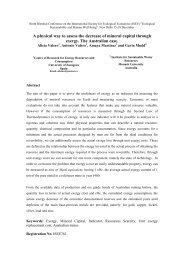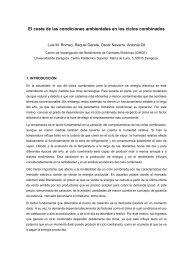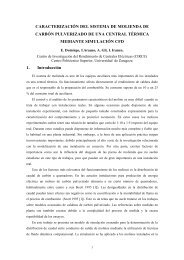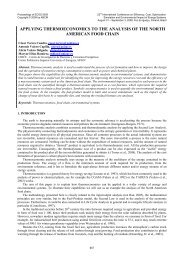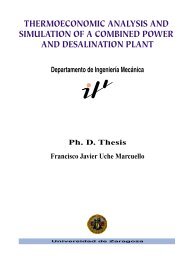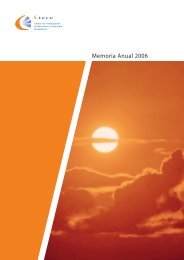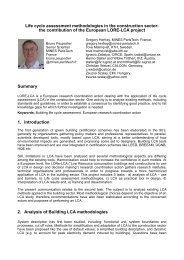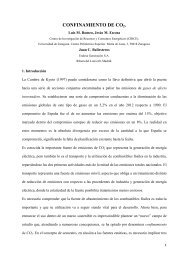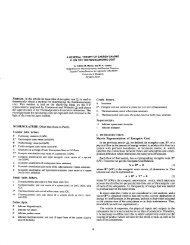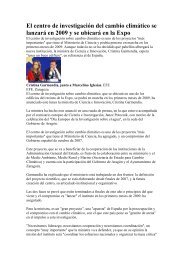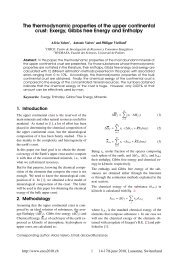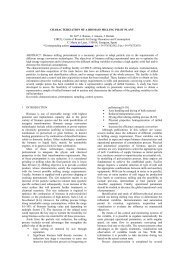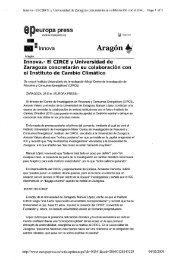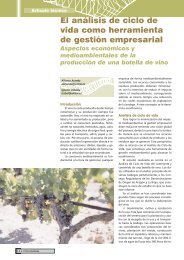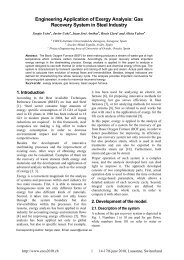Exergy evolution of the mineral capital on earth - circe
Exergy evolution of the mineral capital on earth - circe
Exergy evolution of the mineral capital on earth - circe
You also want an ePaper? Increase the reach of your titles
YUMPU automatically turns print PDFs into web optimized ePapers that Google loves.
2 STARTING POINT, OBJECTIVES AND SCOPE<br />
are not in practice recoverable. Only when a combinati<strong>on</strong> <str<strong>on</strong>g>of</str<strong>on</strong>g> natural processes has<br />
worked toge<str<strong>on</strong>g>the</str<strong>on</strong>g>r to produce an enrichment, is an ore to be found. And <str<strong>on</strong>g>the</str<strong>on</strong>g>se complex<br />
processes operate very slowly when compared with <str<strong>on</strong>g>the</str<strong>on</strong>g> whole life-span <str<strong>on</strong>g>of</str<strong>on</strong>g> our species<br />
so far. Hence, it is clear <str<strong>on</strong>g>the</str<strong>on</strong>g> n<strong>on</strong>-renewable nature <str<strong>on</strong>g>of</str<strong>on</strong>g> <str<strong>on</strong>g>mineral</str<strong>on</strong>g> resources, at least from<br />
a human perspective.<br />
The 20 th century was marked by great technological innovati<strong>on</strong>s leading to <str<strong>on</strong>g>the</str<strong>on</strong>g> c<strong>on</strong>sumpti<strong>on</strong><br />
and fur<str<strong>on</strong>g>the</str<strong>on</strong>g>r dispersi<strong>on</strong> <str<strong>on</strong>g>of</str<strong>on</strong>g> huge amounts <str<strong>on</strong>g>of</str<strong>on</strong>g> <str<strong>on</strong>g>mineral</str<strong>on</strong>g> resources previously<br />
c<strong>on</strong>centrated in natural deposits. This fact pushed up <str<strong>on</strong>g>the</str<strong>on</strong>g> ec<strong>on</strong>omies <str<strong>on</strong>g>of</str<strong>on</strong>g> industrialized<br />
countries, but also raised <str<strong>on</strong>g>the</str<strong>on</strong>g> c<strong>on</strong>cern about resources scarcity. Probably, <str<strong>on</strong>g>the</str<strong>on</strong>g><br />
possibility <str<strong>on</strong>g>of</str<strong>on</strong>g> running out <str<strong>on</strong>g>of</str<strong>on</strong>g> energy resources has provoked <str<strong>on</strong>g>the</str<strong>on</strong>g> most worries, especially<br />
due to <str<strong>on</strong>g>the</str<strong>on</strong>g> sharp rise <str<strong>on</strong>g>of</str<strong>on</strong>g> fuel prices. However n<strong>on</strong>-fuel resources are also being<br />
exhausted very rapidly, as shown by Morse [230]: <strong>on</strong>ly in <str<strong>on</strong>g>the</str<strong>on</strong>g> US, over <str<strong>on</strong>g>the</str<strong>on</strong>g> span <str<strong>on</strong>g>of</str<strong>on</strong>g><br />
<str<strong>on</strong>g>the</str<strong>on</strong>g> last century, <str<strong>on</strong>g>the</str<strong>on</strong>g> demand for metals grew from a little over 160 milli<strong>on</strong> t<strong>on</strong>s to<br />
about 3,3 billi<strong>on</strong> t<strong>on</strong>s.<br />
The general attitude that has governed in <str<strong>on</strong>g>the</str<strong>on</strong>g> past was that <str<strong>on</strong>g>the</str<strong>on</strong>g> <strong>earth</strong> is nothing<br />
more than resources to be used. Adam Smith’s invisible hand [321] has been a<br />
guiding principle for those who believe that free trade or market will ultimately lead<br />
to a natural order <str<strong>on</strong>g>of</str<strong>on</strong>g> things. Never<str<strong>on</strong>g>the</str<strong>on</strong>g>less, in <str<strong>on</strong>g>the</str<strong>on</strong>g> early seventies <str<strong>on</strong>g>the</str<strong>on</strong>g> first Arab oil<br />
embargo, <str<strong>on</strong>g>the</str<strong>on</strong>g> peaking <str<strong>on</strong>g>of</str<strong>on</strong>g> oil producti<strong>on</strong>, toge<str<strong>on</strong>g>the</str<strong>on</strong>g>r with <str<strong>on</strong>g>the</str<strong>on</strong>g> studies <str<strong>on</strong>g>of</str<strong>on</strong>g> <str<strong>on</strong>g>the</str<strong>on</strong>g> Club <str<strong>on</strong>g>of</str<strong>on</strong>g><br />
Rome (Forrester [96] and Meadows et al. [218]), started <str<strong>on</strong>g>the</str<strong>on</strong>g> alarm bells ringing<br />
regarding resources scarcity as <str<strong>on</strong>g>the</str<strong>on</strong>g> limit to ec<strong>on</strong>omic growth [221].<br />
In fact, <str<strong>on</strong>g>the</str<strong>on</strong>g> <str<strong>on</strong>g>the</str<strong>on</strong>g>ory that ec<strong>on</strong>omic growth is irrevocably c<strong>on</strong>strained by <str<strong>on</strong>g>the</str<strong>on</strong>g> finiteness<br />
<str<strong>on</strong>g>of</str<strong>on</strong>g> natural resources came at least 1 a century before with <str<strong>on</strong>g>the</str<strong>on</strong>g> British ec<strong>on</strong>omist<br />
Thomas Malthus [206]. The <str<strong>on</strong>g>the</str<strong>on</strong>g>ory <str<strong>on</strong>g>of</str<strong>on</strong>g> Malthus was that <str<strong>on</strong>g>the</str<strong>on</strong>g> efforts <str<strong>on</strong>g>of</str<strong>on</strong>g> an expanding<br />
populati<strong>on</strong> to produce food <strong>on</strong> a limited land base would suffer diminishing returns,<br />
and if reproducti<strong>on</strong> was not checked through moral restraint it would be checked<br />
by famine, war and pestilence. Malthus c<strong>on</strong>temporary David Ricardo relativized <str<strong>on</strong>g>the</str<strong>on</strong>g><br />
Malthusian’s absolute scarcity <str<strong>on</strong>g>of</str<strong>on</strong>g> land. He showed that an expanding competitive<br />
ec<strong>on</strong>omy could always turn to lower-quality land, <str<strong>on</strong>g>the</str<strong>on</strong>g>reby increasing <str<strong>on</strong>g>the</str<strong>on</strong>g> required<br />
labor to produce food and driving up its cost [302].<br />
But classical ec<strong>on</strong>omists were mainly focused <strong>on</strong> land and did not really faced <str<strong>on</strong>g>the</str<strong>on</strong>g><br />
problem <str<strong>on</strong>g>of</str<strong>on</strong>g> depleti<strong>on</strong> <str<strong>on</strong>g>of</str<strong>on</strong>g> <str<strong>on</strong>g>mineral</str<strong>on</strong>g>s and o<str<strong>on</strong>g>the</str<strong>on</strong>g>r n<strong>on</strong>-renewable resources. It was not<br />
until <str<strong>on</strong>g>the</str<strong>on</strong>g> beginning <str<strong>on</strong>g>of</str<strong>on</strong>g> <str<strong>on</strong>g>the</str<strong>on</strong>g> 20 th century, that <str<strong>on</strong>g>the</str<strong>on</strong>g> US c<strong>on</strong>servati<strong>on</strong> movement feared<br />
that progress would end because <str<strong>on</strong>g>the</str<strong>on</strong>g> rapacious present generati<strong>on</strong> would c<strong>on</strong>sume<br />
<str<strong>on</strong>g>the</str<strong>on</strong>g> next <str<strong>on</strong>g>of</str<strong>on</strong>g> its needed natural resources. In <str<strong>on</strong>g>the</str<strong>on</strong>g> 1930s, Harold Hotelling [145] put<br />
numbers to <str<strong>on</strong>g>the</str<strong>on</strong>g> not very rigorous statements <str<strong>on</strong>g>of</str<strong>on</strong>g> <str<strong>on</strong>g>the</str<strong>on</strong>g> c<strong>on</strong>servati<strong>on</strong>ists. According to<br />
Hotelling, resources would be depleted at a declining rate, and <str<strong>on</strong>g>the</str<strong>on</strong>g>ir price would rise<br />
at a rate equal to <str<strong>on</strong>g>the</str<strong>on</strong>g>ir owners’ opportunity rate <str<strong>on</strong>g>of</str<strong>on</strong>g> interest.<br />
In <str<strong>on</strong>g>the</str<strong>on</strong>g> seventies, <str<strong>on</strong>g>the</str<strong>on</strong>g> Club <str<strong>on</strong>g>of</str<strong>on</strong>g> Rome came into being and <str<strong>on</strong>g>the</str<strong>on</strong>g> first attempt at a global<br />
model by J. Forrester was pubilshed in World Dynamics [96]. The limits to Growth<br />
wealth.<br />
1 The French physiocrats came to <str<strong>on</strong>g>the</str<strong>on</strong>g> c<strong>on</strong>clusi<strong>on</strong> in <str<strong>on</strong>g>the</str<strong>on</strong>g> XVIII century that land is <str<strong>on</strong>g>the</str<strong>on</strong>g> source <str<strong>on</strong>g>of</str<strong>on</strong>g> all



